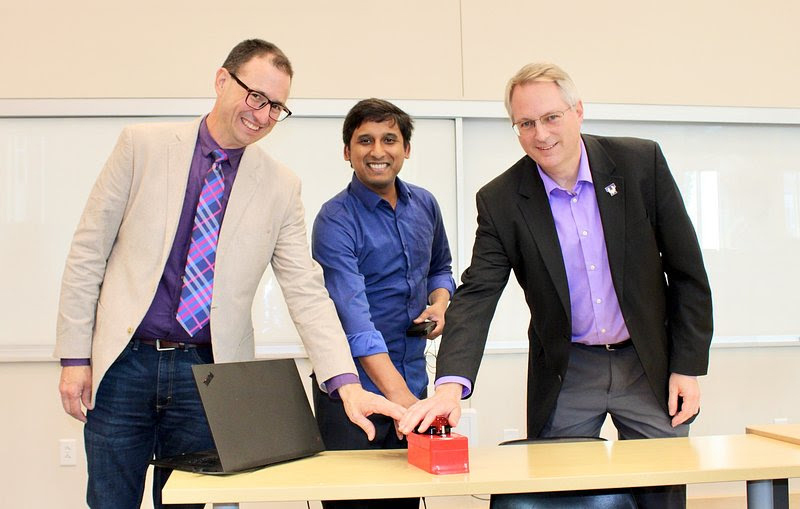Tennessee Tech boosts research, cyber capabilities
Published 1:42 pm Thursday, August 24, 2023

- David Hales, assistant director for network operations, Susmit Shannigrahi, assistant professor of computer science, and Joseph C. Slater, dean of the College of Engineering, press a button which opens the Science DMZ by starting a data transfer into the DMZ. Tennessee Tech photo
|
Getting your Trinity Audio player ready...
|
NEWS RELEASE
Tennessee Tech University has further enhanced its research and data capabilities with the launch of its new Science DMZ, a sophisticated network that makes it easier to quickly and securely transfer data and collaborate with researchers around the world.
The unveiling of the network comes as Tech recently announced an all-time record for externally-funded research – topping $36.3 million during the last fiscal year – and as Tech has gained national recognition as a cyber leader, including being recognized as a center of academic excellence in cybersecurity by the National Security Agency.
Trending
“This is a critical piece of our campus network infrastructure that will help us accelerate research and discovery here at Tennessee Tech,” said David Hales, assistant director for network operations at Tech, in remarks at the Science DMZ’s unveiling. “The Science DMZ will improve the performance of scientific applications by minimizing network latency, delay and jitter. By creating isolated networks for research, the Science DMZ can increase the security of our research data and provide tailored security solutions to preserve performance while preventing any negative impacts to the security of the existing campus network.”
Tech’s Cybersecurity Education, Research and Outreach Center (CEROC) helped facilitate a two-year $276,000 grant from the National Science Foundation for the Science DMZ. CEROC has partnered with Tech’s computer science department to provide continued support for the project. The university’s College of Engineering has undertaken the responsibility of covering the operational expenses for the research network.
Susmit Shannigrahi and Mike Rogers, assistant professor and associate professor, respectively, in the computer science department at Tech, serve as principal investigators for the Science DMZ. Shannigrahi calls it the “core” of Tech’s growing research infrastructure.
“When you look at all of the research infrastructure that we have now, and then the research infrastructure that we are going to build in the future, this would act as the core,” said Shannigrahi. “It will make collaboration with the rest of the research community a lot easier, both nationally and internationally.”
Mike Renfro, high performance computing systems administrator at Tech, says the Science DMZ can deliver benefits for every academic and research department on campus.
“If there are needs for moving large amounts of data, or having collaboration with outside entities or needing to safely connect equipment – any department on campus could potentially use this,” said Renfro.
Trending
With Tech recognized as an R2 doctoral, high-research activity university by the Carnegie national classification system, Shannigrahi says the Science DMZ will further accelerate the university’s research capabilities.
“As the Science DMZ gains momentum, it will foster collaborations not only within the university but also with external partners, enabling seamless data sharing and joint research endeavors,” said Shannigrahi. “This will strengthen Tech’s position as a leading hub for cutting-edge research and innovation, attracting top talent and driving transformative discoveries.”
Learn more about research at Tech by visiting www.tntech.edu/research.





